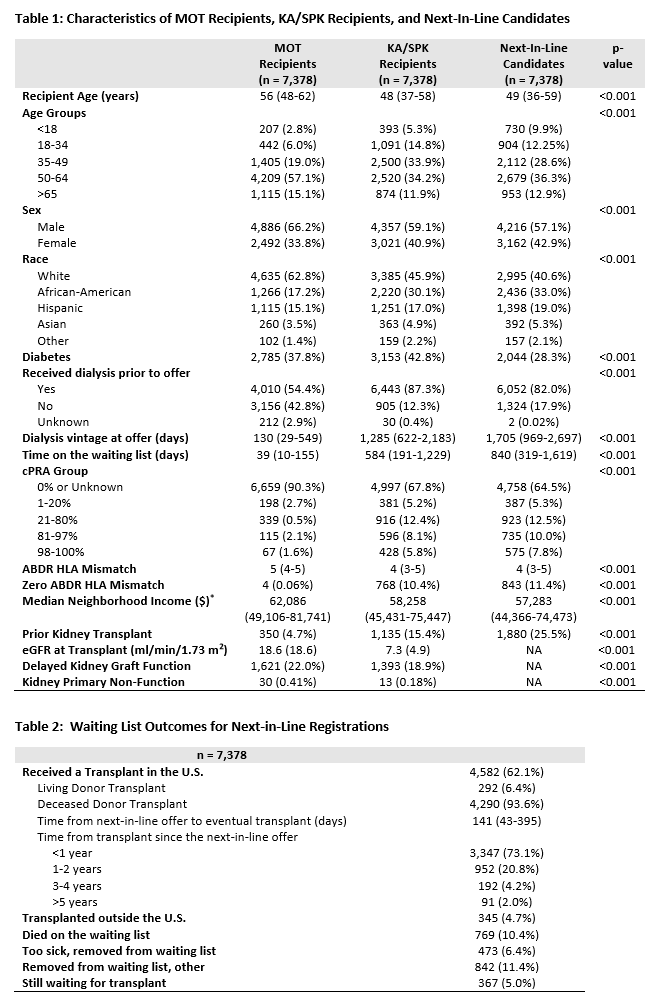The Impact of Multi-Organ Transplant Allocation Priority on Wait-Listed Isolated Kidney Transplant Candidates
1University of Nebraska Medical Center, Omaha, NE, 2United Network for Organ Sharing, Richmond, VA
Meeting: 2020 American Transplant Congress
Abstract number: 15
Keywords: Allocation, Ethics, Kidney/liver transplantation, Public policy
Session Information
Session Name: Kidney Deceased Donor Allocation I
Session Type: Oral Abstract Session
Date: Saturday, May 30, 2020
Session Time: 3:15pm-4:45pm
 Presentation Time: 3:51pm-4:03pm
Presentation Time: 3:51pm-4:03pm
Location: Virtual
*Purpose: Multi-Organ Transplant (MOT) candidates involving a kidney receive higher allocation priority than kidney alone transplant (KAT) candidates. The increasing utilization of MOT has the potential to disadvantage patients requiring a KAT, and may undermine the objectives of the Kidney Allocation System. This study characterizes the KAT candidates potentially impacted by MOT candidate priority.
*Methods: Using the OPTN database, we identified all deceased donors from 2002-2017 who had one kidney used in a MOT and the other kidney used for a KAT (including kidney-pancreas; n = 7,378, median KDPI 28%). We evaluated kidney potential transplant recipient (PTR) data for these donors to identify the KAT candidate who was “next-in-line” based on the PTR sequence number, but who did not receive the kidney offer due to the MOT recipient’s higher priority. We compared characteristics of MOT recipients with next-in-line KAT candidates, and assessed subsequent waitlist outcomes of the next-in-line candidates.
*Results: Next-in-line KAT candidates were younger than MOT recipients and 9.9% of next-in-line candidates were pediatric. The majority of next-in-line candidates were racial minorities (54.1%), compared to 37.2% of MOT recipients. 54.4% of MOT recipients received pre-transplant dialysis versus 82.0% of next in line candidates, and median dialysis vintage at the time of offer was 4.6 years for next-in-line candidates and approximately 4 months for MOT recipients. HLA sensitization was more common in next-in-line candidates (35.5%) than MOT recipients (9.7%). 575 next-in-line candidates (7.8%) were highly sensitized (CPRA 98-100%). 62.1% of next-in-line candidates later received a KAT in the U.S. However, the kidneys eventually received were higher KDPI than the original next-in-line offer. Following the next-in-line offer, a substantial number of next-in-line transplant candidates, 2,084 (28.2%), died or were removed from the waiting list, having never been transplanted.
*Conclusions: Current MOT allocation priority may disadvantage patients awaiting a KAT, including subgroups prioritized by KAS such as highly sensitized and pediatric KAT candidates. While the majority of next-in-line candidates later receive a kidney transplant, a substantial number were not transplanted. To optimize equity and utility in organ allocation, prioritizing select KAT candidate subgroups (e.g. highly sensitized) above certain MOT candidates should be considered.
To cite this abstract in AMA style:
Westphal S, Langewisch E, Robinson A, Wilk A, Plumb T, Mullane R, Merani S, Hoffman A, Maskin A, Miles C. The Impact of Multi-Organ Transplant Allocation Priority on Wait-Listed Isolated Kidney Transplant Candidates [abstract]. Am J Transplant. 2020; 20 (suppl 3). https://atcmeetingabstracts.com/abstract/the-impact-of-multi-organ-transplant-allocation-priority-on-wait-listed-isolated-kidney-transplant-candidates/. Accessed February 19, 2026.« Back to 2020 American Transplant Congress

